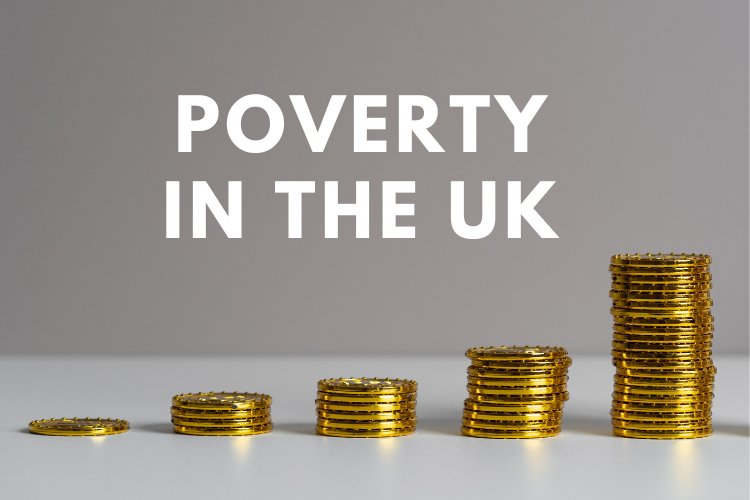Energy Crisis, High Inflation and Rising Poverty: A Socio-Economic Dilemma in the UK
Explore the concerning rise in energy costs and inflation rates in the UK, their impact on the middle class and escalating poverty within society, and citizens' initiatives towards social justice.

Rising energy costs and high inflation in the UK are posing significant challenges for the economy and the general populace. These issues have created social tensions and are especially affecting the middle class. The government's decision to defund essential services has left many people dissatisfied and frustrated with the current state of affairs.
It is disheartening to note that despite being the world's sixth-largest economy and boasting a relatively low unemployment rate, a large number of individuals in the UK are struggling to meet their daily expenses. This unfortunate reality has led to the shocking statistic that almost one in four people in the country now live below the poverty line.
Rising energy costs have been a major factor contributing to this socio-economic dilemma. Exorbitant electricity and gas bills have made it increasingly difficult for individuals and families to make ends meet. As a result, many households are left with no choice but to choose between heating their homes and putting food on the table.
Furthermore, high inflation rates have added another layer of complexity to the situation. As the prices of basic necessities and commodities continue to rise, the already burdened citizens find it increasingly challenging to maintain their standard of living. The cost of groceries, housing, transportation, and healthcare have all soared, leaving many feelings financially vulnerable and socially marginalised.
These economic hurdles are not only affecting individuals' livelihoods but also shaping the social landscape of the UK. It is worth mentioning that the welfare system is collapsing under the strain of these challenges, exacerbating social inequality and pushing the nation back to a state reminiscent of post-World War II.
There is an evident increase in social inequality, with the gap between the wealthy and the less fortunate widening at an alarming rate. The failure of the welfare system to adequately support those in need has resulted in a significant portion of the population being left behind, without access to crucial resources and opportunities.
While the government's limited response to these pressing issues has drawn criticism, citizens have taken the initiative to address these problems themselves. Volunteers have stepped up to fill the gaps created by the collapsing welfare system, providing essential services and support to those most affected by the crisis.
One notable example is the rise of food banks, which have become an indispensable lifeline for many individuals and families who are struggling to afford basic sustenance. These organisations play a vital role in alleviating poverty and ensuring that nobody goes hungry in times of economic hardship.
However, it is crucial to critically analyse the government's actions in response to the growing crisis of poverty in the UK. While there have been attempts to address the issue, many argue that these measures have been insufficient and inadequate. The lack of long-term sustainable solutions and the failure to address the root causes of poverty have left a significant portion of the population still facing dire circumstances.
As we move forward, it is essential to consider potential ways to improve the current scenario. Relying solely on citizens' initiatives and voluntary efforts is not a sustainable solution. The government must take bolder steps to address rising energy costs, curb inflation rates, and implement policies that reduce social inequality and ensure the well-being of all individuals.
Investing in renewable energy sources and promoting energy efficiency can help alleviate the burden of high energy costs on citizens. Additionally, proactive measures such as increasing wages, implementing progressive tax policies, providing affordable housing, and improving access to quality education and healthcare can significantly contribute to narrowing the wealth gap and uplifting those in poverty.
In conclusion, the UK's rising energy costs and high inflation present significant socio-economic challenges, centred around poverty and social inequality. The collapsing welfare system and the government's limited response have only magnified these issues. However, citizens' initiatives and volunteering roles, exemplified by the crucial role of food banks, have provided glimmers of hope amidst the crisis. Nevertheless, a critical analysis of government action against poverty is necessary to highlight the need for more comprehensive and sustainable measures. The way forward lies in investing in renewable energy, implementing proactive policies, and addressing the root causes of poverty to improve the current scenario and ensure a more equitable society for all.
The Domino Effect: How Rising Costs and Inflation Are Shaping the Social Landscape
The interplay between rising costs and inflation in the UK has resulted in a domino effect that is significantly shaping the social landscape of the country. These economic factors have far-reaching consequences, affecting various aspects of individuals' lives and contributing to the deepening socioeconomic divide.
One of the primary ways in which rising costs and inflation impact society is through the increased financial burden on households. As the prices of essential goods and services continue to rise, individuals and families find it increasingly challenging to meet their basic needs. High inflation rates mean that the value of money decreases over time, making it harder for people to save and plan for the future.
For the middle class, in particular, the impact is profound. Many individuals who were once considered financially stable are now struggling to keep up with the rising costs. This can lead to a plethora of financial issues, including mounting credit card debt, difficulty paying mortgages or rent, and limited disposable income for other essential expenses.
As the middle class bears the brunt of these economic challenges, it is also important to recognise the impact on low-income households. Those already living below the poverty line find it increasingly difficult to make ends meet. Basic necessities like food, shelter, and healthcare become even more unaffordable, further deepening the cycle of poverty.
Moreover, the domino effect of rising costs and inflation extends beyond individual households. Small businesses, which often form the backbone of local economies, are particularly vulnerable. Increased operating costs and reduced consumer spending power can lead to financial strain and, in some cases, closure. This not only impacts the livelihoods of business owners but also results in a loss of employment opportunities for others.
Additionally, these economic difficulties are shaping the social fabric of the UK. The unequal distribution of resources and opportunities perpetuates social inequality. Those who can afford to meet the rising costs are able to maintain their standard of living or even thrive, furthering the gap between the haves and the have-nots.
The impact of rising costs and inflation is not confined to the economic realm alone. It also has implications for mental and physical well-being. Financial stress, commonly associated with economic pressures, can lead to anxiety, depression, and other mental health issues. Moreover, the inability to afford adequate healthcare and proper nutrition can negatively affect physical health, exacerbating existing health disparities.
It is crucial to address these problems holistically as the domino effect of rising costs and inflation continues to shape the social landscape. Efforts should be made to reduce the cost of living, empower individuals and households to improve their financial resilience, and create an inclusive society that ensures equal access to opportunities for all.
Policies aimed at curbing inflation and stabilising prices are crucial to alleviating the burden on households. Additionally, initiatives that promote financial literacy and provide support for budgeting and debt management can help individuals navigate the challenges posed by rising costs.
It is also essential to address the root causes of social inequality. This includes implementing progressive taxation policies, investing in education and skills training to improve employment prospects, and providing affordable housing options. By tackling these underlying issues, society can work towards a more equitable and inclusive future for all its members.
In summary, the domino effect of rising costs and inflation is significantly shaping the social landscape in the UK. The burden on households, particularly the middle class and low-income families, is increasing, perpetuating social inequality and deepening the cycle of poverty. Moreover, the economic challenges have implications for mental and physical well-being, impacting individuals and communities on multiple levels. However, by implementing policies that address these issues holistically and promoting financial resilience and inclusivity, society can aim for a fairer and more prosperous future.
The Collapsing Welfare System and Mounting Social Inequality: A Backstep to Post-World War II
The socio-economic challenges in the UK, particularly the rising energy costs, high inflation, and their consequences, have exposed and exacerbated the flaws in the welfare system. The collapse of the welfare system, coupled with mounting social inequality, has pushed the nation back to a state reminiscent of the post-World War II era.
Post-World War II, the UK embarked on a mission to build a robust welfare system, aiming to provide a safety net for its citizens. The system was designed to ensure that every individual had access to basic necessities such as housing, healthcare, and education, regardless of their socio-economic background.
However, in recent years, budget cuts and austerity measures have taken a toll on the welfare system, weakening its ability to fulfil its intended purpose. Essential services such as healthcare, education, and housing have been defunded, leaving numerous individuals and families vulnerable and struggling to make ends meet.
The collapse of the welfare system has had the most severe impact on those in poverty and marginalised communities. These individuals rely heavily on public services and benefits to meet their basic needs, and the reduction or removal of these resources has left them in dire circumstances.
Furthermore, the erosion of the welfare system has led to a widening gap between the rich and the poor, exacerbating social inequality. The wealthiest in society have the means to access private services and resources, ensuring their well-being and prosperity. On the other hand, those unable to afford private alternatives have limited access to essential services, intensifying their socio-economic struggles and making upward mobility elusive.
Mounting social inequality has far-reaching consequences, impacting various aspects of individuals' lives. Children from low-income households face limited opportunities for a quality education, hindering their chances of breaking the cycle of poverty. Lack of access to affordable housing leaves vulnerable individuals and families at risk of homelessness and unstable living conditions.
The consequences of the collapsing welfare system and mounting social inequality are not only economic but also deeply rooted in societal well-being. There is a significant strain on social cohesion, leading to a lack of trust in institutions and a sense of injustice among marginalised communities.
To address this socio-economic backstep, a concerted effort is required from both the government and society as a whole. The government must prioritise the rebuilding of the welfare system and reinvest in essential services to ensure that every citizen has access to the resources and opportunities they need to thrive.
Reforming the welfare system should involve a comprehensive approach that addresses the root causes of poverty and inequality. It should focus on proactive measures such as increasing the minimum wage, implementing progressive taxation policies, and creating affordable housing options.
Additionally, investing in education, particularly in underserved communities, can break the cycle of poverty and equip individuals with the skills needed for economic empowerment. Accessible and affordable healthcare services should be a priority to safeguard the well-being of all citizens.
However, it is not just the responsibility of the government to address these challenges. Society as a whole must advocate for change, creating a united voice demanding a fairer and more equitable system. Grassroots organisations, activists, and citizens at large can play a crucial role in pushing for policy reforms, raising awareness, and supporting initiatives that aim to reduce social inequality and rebuild the welfare system.
In conclusion, the collapsing welfare system and mounting social inequality in the UK have taken the nation back to a post-World War II era. The defunding of essential services and the widening socio-economic divide have created significant hardships for vulnerable individuals and marginalised communities. To address this, a comprehensive approach involving government action and societal collaboration is required. Rebuilding the welfare system, investing in education and healthcare, and advocating for policy reforms are vital steps in creating a fairer and more equitable society for all.
Citizens' Initiatives: Volunteer Roles and Impact Amidst the Crisis
Amidst the challenges posed by rising energy costs, high inflation, the collapsing welfare system, and mounting social inequality, citizens in the UK have taken the initiative to address these issues themselves. Volunteers have stepped up to play crucial roles and make a significant impact on individuals and communities affected by the ongoing crisis.
These citizens' initiatives have emerged as a response to the gaps left by the failing welfare system in providing adequate support and resources to those in need. Individuals from diverse backgrounds, motivated by a sense of social responsibility and empathy, have come together to help bridge these gaps and alleviate the suffering caused by socio-economic challenges.
Volunteering roles within these initiatives vary widely and address a broad range of needs. From providing food and shelter to advocating for policy changes, these volunteers play a pivotal role in supporting vulnerable individuals and communities. Their effects go beyond providing immediate relief and enhance the crisis victims' overall resilience and well-being.
One notable area where citizens' initiatives have made a substantial impact is in the provision of essential services. As public services face budget cuts and resource constraints, volunteers have stepped in to fill these gaps. They offer services such as healthcare assistance, counselling, and legal aid to individuals who would otherwise struggle to access these resources.
Neighbourhood community groups have also emerged as powerful forces for change. These grassroots organisations bring together local residents who collaborate to address the specific challenges faced by their community. They organise initiatives like community gardens, educational programmes, and skill-building workshops to empower individuals and foster a sense of belonging.
Food banks have become a vital lifeline for many individuals and families experiencing food insecurity. These initiatives rely heavily on volunteers to collect and distribute food donations, ensuring that people do not go hungry. Additionally, food banks often offer additional support services such as job training and advice on financial management, providing holistic assistance to those in need.
Besides providing direct aid, citizens' initiatives also play an essential role in advocacy and raising awareness about the socio-economic challenges faced by the UK. Volunteers engage in activities such as public speaking, community organising, and online campaigns to highlight the plight of marginalised communities and rally support for policy changes.
The impact of citizens' initiatives goes beyond immediate relief. These initiatives often empower and build resilience within the communities they serve. By involving and engaging local residents, they foster a sense of ownership and facilitate long-term solutions to address the underlying causes of the crisis.
However, it is important to recognise that citizens' initiatives alone cannot be a substitute for a well-functioning welfare system. While their efforts are commendable and make a significant difference, they often operate on limited resources and rely heavily on volunteers' dedication and personal contributions.
Therefore, it is vital for these initiatives to receive adequate support and recognition from the government and society at large. Governments must acknowledge the crucial role that citizen initiatives play and collaborate with volunteers to create an environment that supports their efforts. This can include providing funding, creating volunteer-friendly policies, and incorporating their feedback and expertise in decision-making processes.
At the societal level, it is crucial to appreciate and support the efforts of volunteers. Recognising their contributions through public recognition, fostering a culture of volunteerism, and creating platforms for networking and collaboration can help sustain and enhance the impact of citizens' initiatives.
In conclusion, citizens' initiatives have emerged as powerful and impactful responses to the challenges posed by rising energy costs, high inflation, the collapsing welfare system, and mounting social inequality. Volunteers play diverse roles, supporting individuals and communities affected by the crisis, providing essential services, and advocating for change. While their efforts are commendable, it is crucial to recognise that these initiatives cannot replace a well-functioning welfare system. Governments and society must collaborate to support and enhance the impact of citizens' initiatives, creating a more resilient and compassionate society for all.
The Role of Food Banks in Alleviating Poverty
Food banks have emerged as a crucial pillar in the efforts to alleviate poverty in the UK amidst the challenges posed by rising energy costs, high inflation, and the collapsing welfare system. These organisations provide a lifeline to individuals and families experiencing food insecurity, playing a vital role in ensuring that no one goes hungry in times of economic hardship.
The role of food banks extends beyond the immediate provision of food. They serve as a vital safety net for those who find themselves in vulnerable situations due to poverty and social inequality. Individuals and families who struggle to afford nutritious meals can turn to food banks for assistance, providing them with much-needed support during difficult times.
One of the primary tasks of food banks is to collect and distribute food donations. These donations come from various sources, including individuals, businesses, and community organisations. They are sorted, stored, and then distributed to those in need through a network of distribution centres or directly at local food bank locations.
By providing access to food, food banks help alleviate the immediate effects of poverty and hunger. They enable individuals and families to meet their basic nutritional needs, preventing hunger-related health issues and ensuring that individuals have the energy and resources necessary to pursue their goals and improve their circumstances.
Food banks also play a crucial role in promoting food education and nutritional awareness. Many food banks offer nutrition programmes, cooking classes, and workshops to empower individuals with the knowledge and skills to make healthy food choices on a limited budget. These initiatives not only address immediate hunger but also contribute to long-term improvement in individuals' well-being and self-sufficiency.
Beyond food provision and education, food banks often serve as a gateway to accessing other essential services. They act as referral hubs, connecting individuals and families to additional support such as housing assistance, employment services, healthcare resources, and financial counselling. This holistic approach helps individuals navigate the complexities of poverty, addressing multiple aspects of their lives and working towards sustainable solutions to lift them out of hardship.
Additionally, food banks foster a sense of community and solidarity. They bring together volunteers, donors, and recipients from different backgrounds, creating opportunities for interaction and empathy. This sense of community can help combat stigma and actively contribute to building a more inclusive society, fostering a greater understanding of the challenges faced by individuals and families who rely on food banks.
While food banks provide essential support, it is essential to recognise that they are not a long-term solution to poverty and food insecurity. They operate within a complex web of socio-economic challenges that must be addressed comprehensively. Government policies and programmes should focus on addressing the root causes of poverty, reducing inequality, and ensuring that individuals have access to stable employment, affordable housing, education, and healthcare.
Furthermore, collaboration between food banks, governments, and charitable organisations is crucial for the sustainability and effectiveness of food bank efforts. Governments can provide financial support, create policies that enable food banks to operate more efficiently, and facilitate partnerships with other essential service providers. Charitable organisations and businesses play a vital role in donating food, funds, and resources to support the operations of food banks.
In conclusion, food banks play a significant role in alleviating poverty in the UK. They provide essential food provisions, nutritional education, and access to additional support services. While food banks address immediate needs, they must operate in conjunction with comprehensive strategies that address the underlying causes of poverty and socio-economic inequality. By recognising the value of food banks, supporting their operations, and working towards systemic change, society can take meaningful steps towards a more just and equitable future for all.
A Critical Analysis of Government Action Against Poverty
The UK government has faced significant criticism regarding its actions and policies in addressing poverty amid the challenges of rising energy costs, high inflation, and the collapsing welfare system. A critical analysis reveals the shortcomings and limitations of government efforts to tackle this pressing issue.
One of the key criticisms revolves around the inadequate measures taken to address the root causes of poverty. While some policies and initiatives have been implemented, the focus has often been on providing short-term relief rather than implementing long-term, sustainable solutions. This approach fails to address the systemic issues that contribute to poverty and perpetuate social inequality.
One particular area of criticism is the insufficient investment in social support programmes. Budget cuts and austerity measures have disproportionately affected welfare programmes, leading to reduced resources and support for those in need. This has left vulnerable individuals and families with limited access to crucial services such as affordable housing, healthcare, and education.
The government's response to rising energy costs and high inflation has also faced scrutiny. While efforts have been made to address these issues, critics argue that they have been largely reactive rather than proactive. Measures such as fuel subsidies or price caps on essential goods may provide temporary relief, but they do not address the underlying issues contributing to rising costs and inflation in the first place.
Furthermore, the impact of government policies on the most vulnerable populations has been a subject of concern. For instance, changes to the welfare system, such as the introduction of Universal Credit, have been associated with delays, bureaucratic hurdles, and the exacerbation of poverty for some individuals and families. The lack of a comprehensive assessment of the impact of such policies on different groups has sparked concerns about their effectiveness and fairness.
The lack of coordination and integration between different government departments is another aspect that has been subject to criticism. Poverty is a complex issue that requires a multi-faceted approach, involving collaboration between various sectors such as housing, education, health, and employment. However, critics argue that there has been a lack of cohesive and coordinated efforts, resulting in fragmented and ineffective solutions.
Additionally, the government's actions have also been questioned in terms of their responsiveness to changing circumstances. Economic challenges and social inequalities have been exacerbated by external factors, such as the COVID-19 pandemic. Critics argue that the government's response to these unprecedented circumstances has been insufficient and that more comprehensive and targeted measures are needed to mitigate the impact on vulnerable populations.
It is important to note that while there are criticisms and concerns about government action against poverty, there have been some positive steps taken as well. For example, efforts to increase the minimum wage, expand access to education and skills training, and invest in infrastructure projects can contribute to reducing poverty and inequality. However, these actions are often insufficient to address the scale and urgency of the challenges at hand.
In conclusion, a critical analysis of government action against poverty in the UK highlights several shortcomings and limitations. The focus on short-term relief rather than long-term sustainable solutions, insufficient investment in social support programmes, and lack of coordination between different sectors have contributed to the continuation of poverty and social inequality. It is imperative that the government reevaluates its approach, addressing the root causes of poverty and implementing more comprehensive and responsive strategies to create a fairer and more equitable society for all.
The Way Forward: Suggestions for Improving the Current Scenario
The current socio-economic challenges faced by the UK, including rising energy costs, high inflation, the collapsing welfare system, and mounting social inequality, require a strategic and holistic approach to create meaningful change. Here are some suggestions for improving the current scenario and working towards a fairer and more prosperous society.
1. Strengthening the Welfare System: Increase funding for essential services such as healthcare, education, and housing to ensure equal access for all individuals, particularly those in vulnerable situations. Reform welfare policies to streamline processes and reduce bureaucracy, ensuring that support reaches those in need efficiently and effectively. Conduct comprehensive assessments to identify gaps in the current welfare system and tailor solutions to meet the specific needs of diverse communities.
2. Tackling Rising Energy Costs and Inflation: Invest in renewable energy sources and promote energy efficiency measures to reduce dependency on fossil fuels and lower energy costs for households and businesses. Monitor and regulate markets to prevent price gouging and unfair practices that contribute to inflation. Implement policies that support the development and growth of local businesses, foster competition, and ensure fair pricing for consumers.
3. Promoting Financial Inclusion and Economic Empowerment: Increase the minimum wage and promote the implementation of living wage standards to ensure that individuals earn a sustainable income that covers their basic needs. Provide accessible and affordable financial services, including financial literacy programmes and access to low-interest credit, to empower individuals to manage their finances effectively and avoid debt traps. Support entrepreneurship and small businesses by providing mentorship, access to resources, favourable tax policies, creating economic opportunities, and reducing dependency on unstable employment.
4. Addressing Social Inequality: Implement progressive taxation policies that redistribute wealth and resources more equitably, ensuring that those with the highest incomes contribute a fair share. Invest in quality education to provide equal opportunities for all individuals, regardless of their socio-economic background, enabling social mobility and breaking the cycle of poverty. Prioritise the development of affordable housing options, ensuring that everyone has access to safe and stable housing.
5. Encouraging Collaboration and Partnerships: Foster collaboration between the government, civil society organisations, businesses, and communities to develop comprehensive strategies and initiatives to address poverty and inequality. Establish platforms and spaces for dialogue and consultation, ensuring that the voices and experiences of those affected by poverty are heard and integrated into decision-making processes. Recognise and support the work of volunteers and community organisations, providing resources and funding to sustain their efforts and maximise their impact.
6. Continuous Monitoring and Evaluation: Regularly assess the effectiveness of policies, initiatives, and programmes aimed at addressing poverty and inequality, making data-driven decisions for continuous improvement. Monitor and address emerging challenges and changing circumstances, constantly adapting strategies to address evolving needs and socio-economic trends. Foster transparency and accountability, ensuring that the government and relevant stakeholders are held responsible for their actions and commitments. In conclusion, addressing the socio-economic challenges in the UK requires a multi-faceted approach that addresses the root causes of poverty, empowers individuals, and promotes equality of opportunity.
By strengthening the welfare system, tackling rising energy costs and inflation, promoting financial inclusion, addressing social inequality, fostering collaboration, and continuously monitoring and evaluating progress, the UK can work towards a more inclusive and prosperous society for all its citizens.
Meanwhile…
You can just join our account management program and relax. We will make at least 1% profit for you on your account – Check out how by clicking on the link below.
Have fun trading!
Have a great journey, and may you catch some big waves on your way to prosperity!
To see this for real, click here.
https://www.myfxbook.com/members/SankarGanesan/tradefxp-trend-antitrend-day-trading/10404725
To read why you should be with us, click here
To open an account, click here.
To see our regulation certificate: click here.
To see our news with the IFMRRC: click here.
For claims, click here.
For the main site: click here.
For blogs and articles: click here.
Main Website: www.tradefxp.com



 admin
admin 










